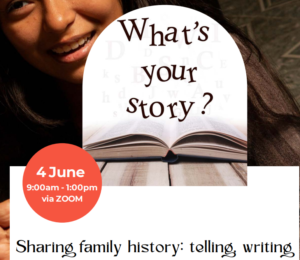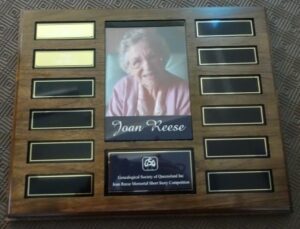Writing and sharing family stories at GSQ
The GSQ Writing Group has been going since 2011. Its aim has been to support all GSQ members in their writing endeavours no matter what stage of the writing process they are at. 2022 has been a memorable year to date with some notable achievements.
 The first of these achievements was the design and delivery of a mini-seminar on Sharing family stories, either through writing or telling. The Writing Group was the instigator of this mini-seminar and several members, led by Janice Cooper, worked hard to put together an interesting program. The premise behind the mini-seminar was that it was possible to share family stories in many different ways. We heard from a children’s author, Kate Simpson, who shared the history of her novel Anzac Girl: the war diaries of Alice Ross King. Indyana Horobin, an academic who spoke on intergenerational interviewing, related how he engaged with his grandfather and found out a great deal about his military service. We learned about using mindmaps in our research courtesy of Sharyn Merkley who demonstrated how mindmaps can serve as an excellent planning tool. Alex Daw extolled the benefits of blogging as a means of connecting with others to enhance our family history research in many different ways. Three GSQ members offered short presentations on different ways of telling stories: Judy Lofthouse demonstrated how she had used photos from her personal collection to create a family story book which would engage family members across a broad set of ages and interests. Bev Murray built on the theme of sharing her family’s story by turning photos and commentary in Powerpoint into a movie. We watched the short movie she had created which revealed the story of one of her ancestors who sadly did not return from service in World War One. With a moving soundtrack, this movie would certainly appeal to a wide audience. In my talk I demonstrated that there could be many stories behind a photo and illustrated this with two from my collection. I suggested that analysing the photos and putting them into context could help to reveal those stories, although we may not always be able to determine the correct one.
The first of these achievements was the design and delivery of a mini-seminar on Sharing family stories, either through writing or telling. The Writing Group was the instigator of this mini-seminar and several members, led by Janice Cooper, worked hard to put together an interesting program. The premise behind the mini-seminar was that it was possible to share family stories in many different ways. We heard from a children’s author, Kate Simpson, who shared the history of her novel Anzac Girl: the war diaries of Alice Ross King. Indyana Horobin, an academic who spoke on intergenerational interviewing, related how he engaged with his grandfather and found out a great deal about his military service. We learned about using mindmaps in our research courtesy of Sharyn Merkley who demonstrated how mindmaps can serve as an excellent planning tool. Alex Daw extolled the benefits of blogging as a means of connecting with others to enhance our family history research in many different ways. Three GSQ members offered short presentations on different ways of telling stories: Judy Lofthouse demonstrated how she had used photos from her personal collection to create a family story book which would engage family members across a broad set of ages and interests. Bev Murray built on the theme of sharing her family’s story by turning photos and commentary in Powerpoint into a movie. We watched the short movie she had created which revealed the story of one of her ancestors who sadly did not return from service in World War One. With a moving soundtrack, this movie would certainly appeal to a wide audience. In my talk I demonstrated that there could be many stories behind a photo and illustrated this with two from my collection. I suggested that analysing the photos and putting them into context could help to reveal those stories, although we may not always be able to determine the correct one.
This was a wonderful morning and a first for the Writing Group to offer a program such as this to a wider audience than the Writing Group itself. The ability to connect virtually via Zoom enables GSQ to spread its wings further afield than Brisbane. Attendees came from as far afield as New Zealand and New South Wales as well as Queensland.

The Joan Reese memorial short story plaque which is on display at GSQ
Another achievement in 2022 related to the annual Joan Reese Memorial Short Story competition. Initiated in 2012 the award recognised the contribution of Joan Reese to provision of access to NSW colonial records and the assistance she provided to many GSQ members over the years before “everything was online”. A different topic is chosen each year and in 2022 it was “A journey”. Entrants were asked to write a family story which focussed on a journey that was significant to the family. We received more entries this year than in previous years and the quality of the entries was very high. We learnt about a family who travelled to Italy from Australia via Japan, China and Russia in the period leading up to the First World War; a drover who was part of a team taking a mob of cattle to the remote Diamantina Lakes Station in Queensland; the story of a man who came to Australia and may be the missing link in a family history. Other stories included German migration to Queensland; a family heirloom which has travelled far; and stories of migrant ancestors who left their homes in England to begin new lives in Australia. The journeys for some of these migrants were hazardous whereas for others it was smooth sailing.
The winning author receives a $100 cash prize, partly funded by the Writing Group, and the winning story is published in GSQs journal Generation, where all entries also eventually appear. At 2500 words, submitting stories to this competition is a terrific way to start writing up a family story and the Writing Group encourages everyone to consider doing this.
Covid has presented some challenges for the Group which grew into a wonderfully collaborative group through its regular meetings at GSQ. Transitioning to a Zoom platform has meant that we had to change our way of doing things. Sadly we’ve missed meeting some of our members who do not use the Zoom platform, but we’ve gained some new members who live outside the Brisbane metropolitan region and are not able to attend GSQs premises in Wishart. Our hope is to have hybrid meetings by the end of the year so that we can have the best of both worlds.
We set members a topic to write about in 250-300 words. Our topics have ranged from stories derived from photos, newspaper extracts, family traditions, grandparents’ marriage and childhood memories. Our latest one in June 2022 was to talk about the weather and the impact this could have had on our family. Australia experiences significant extremes: cyclones, floods and stormy weather featured in the short stories, as did weather diaries of great importance to rural families. The importance of the weather to those who want to go sailing and how the ability of family members to predict the weather increased over time. Talking about the weather is a great way to get older family members to recollect stories from their younger years. My story related to the events on a foggy day in England.
To complement our discussion of stories written by group members, we have offered skills- and knowledge-based activities from time to time, especially when we were able to meet in person. We have also had guest speakers who have shared their journey towards producing a family history. As can be seen from this summary of Writing Group activities, we cover a wide spectrum.
Preserving our history for future generations is a wonderful legacy. Not everything has to be written down; not everyone has to produce a leather-bound volume. There are many ways of preserving our family story. I hope this post has inspired you to get started.

Pauline, as you know, I have been a member of this writing group almost since its’ inception. I believe that you must be commended on your excellent leadership of this group. You have done an outstanding job of preparing for and presenting our meetings, making everyone feel included and respected. That’s an impressive achievement in itself. Being part of this group has given me the enthusiasm and confidence to ‘have a go’ I am greatly indebted to you and the members of the writing group. Well done and sincere thanks.
Thanks so much for your kind comments Bev. It’s Writing Group members like you who make that group so special.